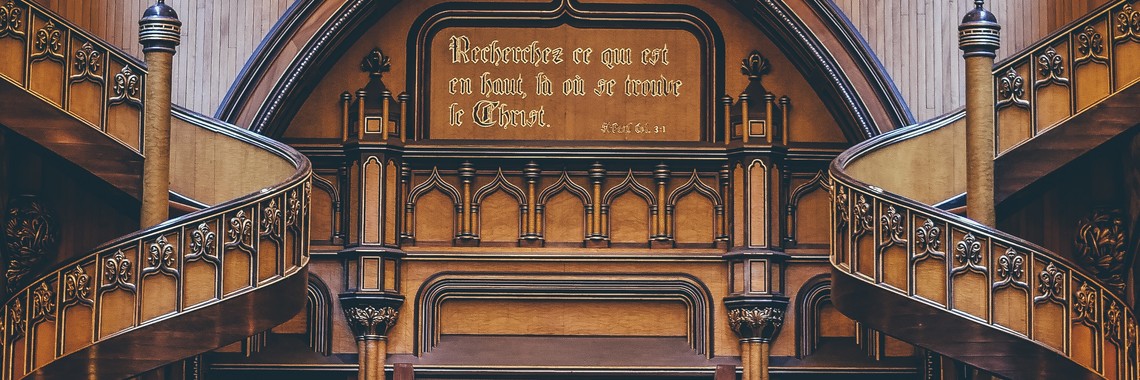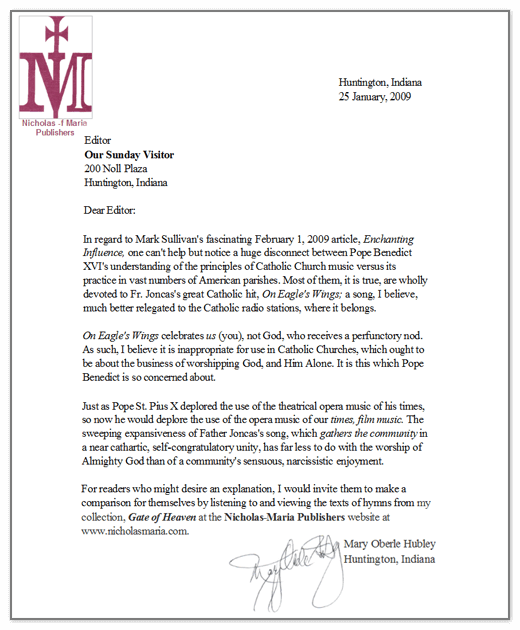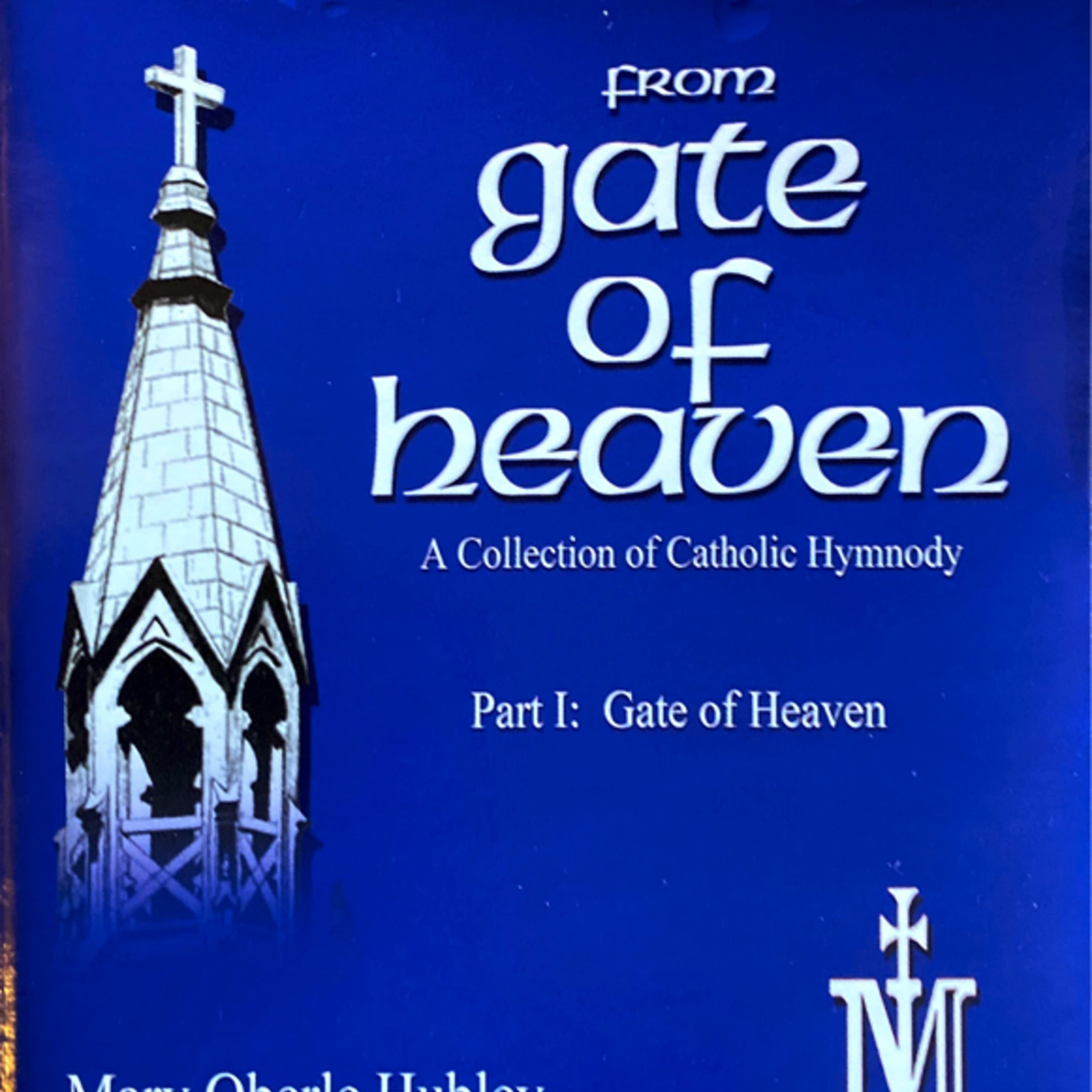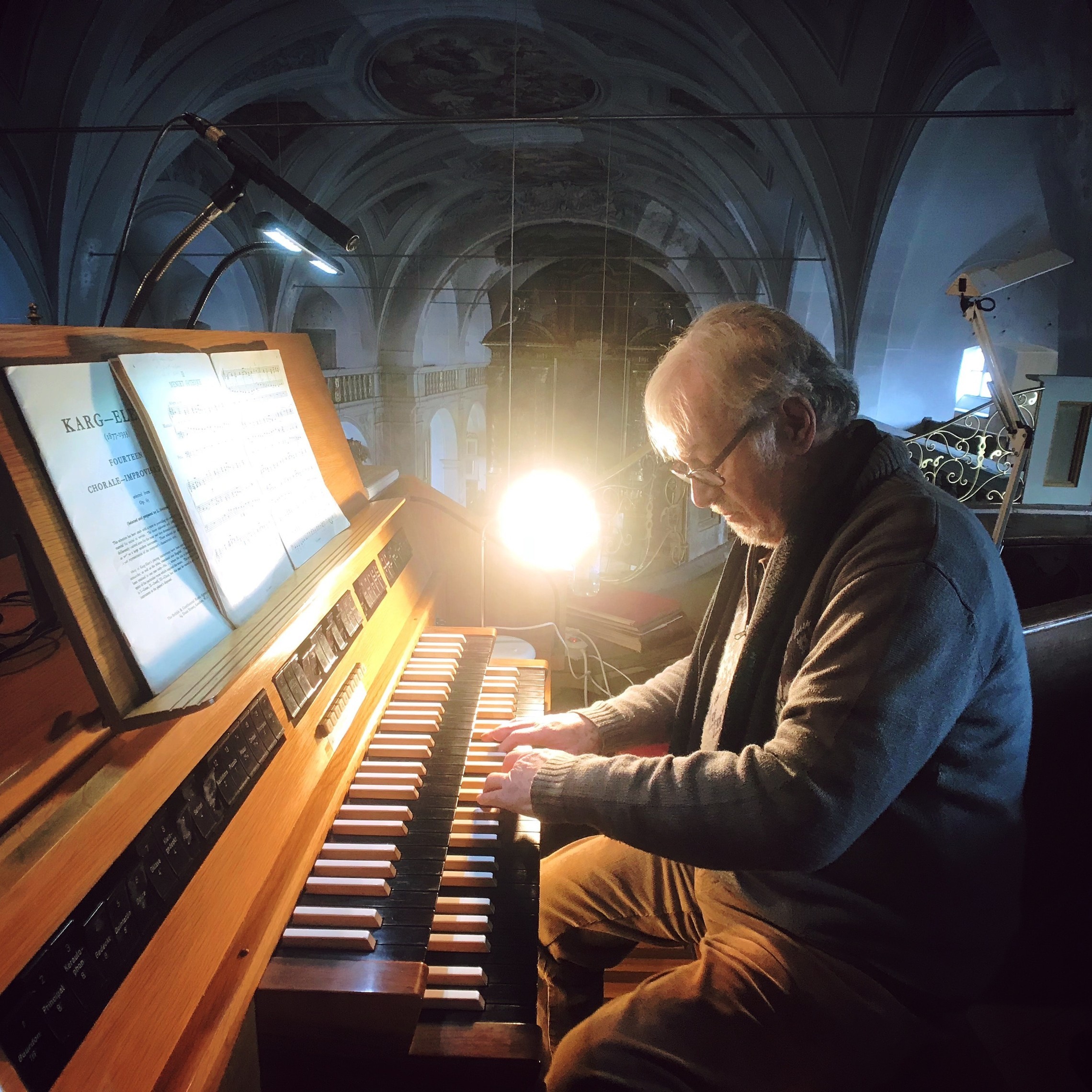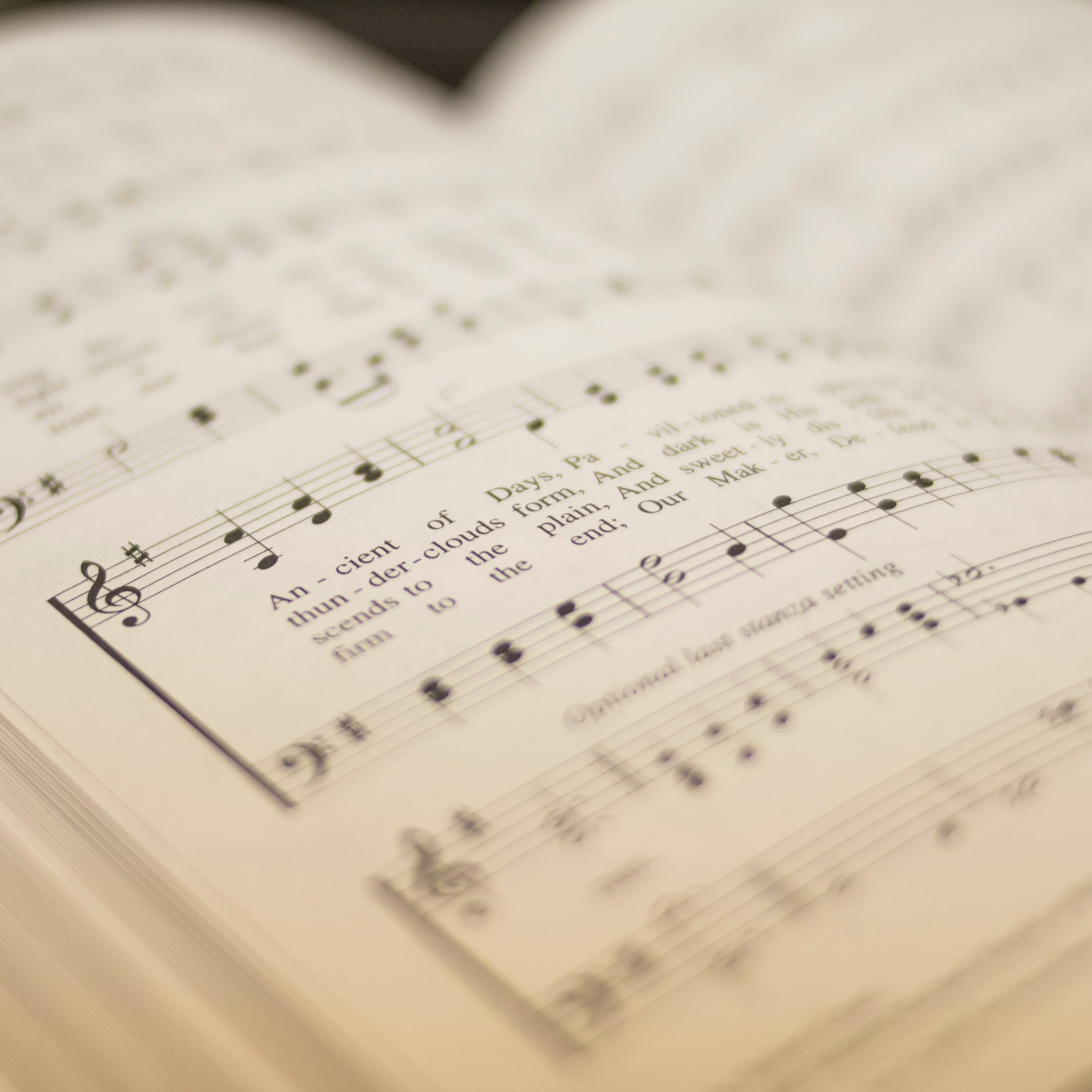(Note: This letter describing the origins and the work of the Midwest Conference on Sacred Music was dated Spring, 2001. Provides a Church musician’s lament . . . )
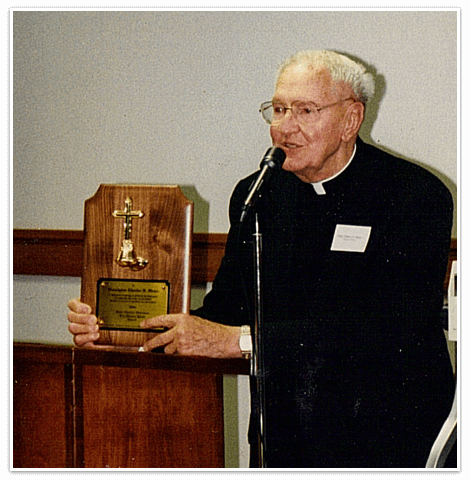
A beaming Msgr. Charles N. Meter of Chicago displays the St. Charles Borromeo Pro Musica Sacra Award just awarded him by the Midwest Conference on Sacred Music, Fall, 1997. Recipients included Msgr. Richard J. Schuler of Saint Paul, Minnesota (requiescat in pace); Father Eduard Perrone of Assumption Grotto Church in Detroit, Michigan; and Father Frank Phillips, Chicago.)
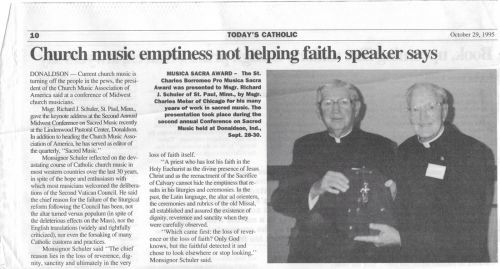
Dear Fellow Devotee’ of Sacred Music:
As I write this letter. I have before me one of my most favorite of all photographs, a copy of which is here enclosed. In it Msgr. Charles N. Meter (requiescat in pace) of Chicago is presenting the 1995 St. Charles Borromeo Pro Musica Sacra Award to Msgr. Richard J. Schuler, who was editor for many years of the quarterly publication, Sacred Music. The occasion was the Second Annual Midwest Conference on Sacred Music, held September 28-30, 1995 at the historic Ancilla Domini Motherhouse in Donaldson, Indiana.
Allow me to tell you one of my experiences regarding Msgr. Meter.
I first spoke to Monsignor after having asked Father Robert A. Skeris during the 1994 conference (when he gave his "Reflections on the Sacred and the Profane") whom he would recommend as a worthy recipient to follow Monsignor Schuler. Father unhesitantly replied. "Well, why don't you contact Monsignor Charles Meter, one of the most deserving of all Church musicians, who lives nearby in Chicago?”
You can, I’m sure, feel my confusion when, in answer to my earnest request of Father Meter- - that he honor the Midwest Conference by acceptance of the St. Charles Borromeo Pro Musica Sacra Award - - he respectfully refused.
"Mary, I'm sorry, but I have had my heart broken so many times by what has happened to Sacred Music that, finally, I decided that I would spend my golden years completely separated from the practice of Church Music. Then at least I could have some peace, instead of continuous battles."
My persuasions were unable to move this valiant priest/musician, who in his lifetime had unstintingly put his prodigious musical talents wholly at the service of the Church. As Director of the Cathedral Choristers of Holy Name Cathedral in Chicago for over thirty years, Monsignor Meter had seen to the musical training and development of more than 400 seminarians, handing down to them the Church's solicitude in regard to the proper musical and liturgical training of her priests.
A couple months later, however, having been told of Monsignor Meter's reputation for generosity to others, I tried another approach.
"For the sake of a great musician, Father: the long-standing Editor of Sacred Music, Monsignor Richard J. Schuler of Saint Paul, Minnesota, would you agree to officiate at the Award proceedings?"
Monsignor took the bait. He could not, and did not, resist my request this time.
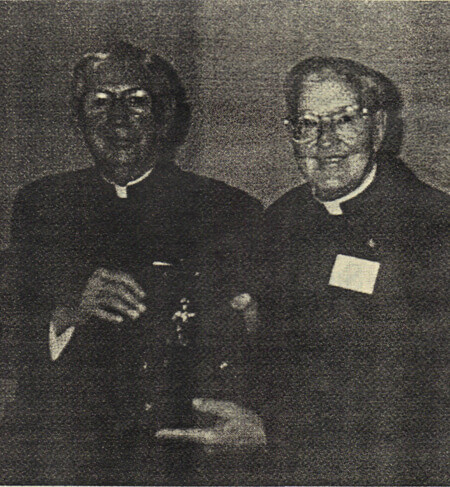
PRO MUSICA SACRA AWARD - The St. Charles Borromeo Pro Musica Sacra Award was presented to Msgr. Richard J. Schuler of Saint Paul, Minn., by Msgr. Charles N. Meter of Chicago (R.I.P., October 6, 1998), for his many years of unparalleled achievements in Sacred Music. The presentation took place during the Second Annual Midwest Conference on Sacred Music held at Donaldson, Indiana, Sept.28-30, 1995.
I AM ASKING YOU TO HELP ME CONTINUE THE WORK OF THE MIDWEST CONFERENCE ON SACRED MUSIC
Up to this point, financial assistance by means of grants and endowments has been denied; and for this work to continue without interruption, the financial support of Friends of the Midwest Conference is essential.
You might well ask why am I addressing this request to you, specifically. Candidly, because you had at some time contacted me, whether in an inquiry about the Annual Midwest Conference on Sacred Music, or through a purchase of my collection of hymns entitled Gate of Heaven or of the Gate of Heaven sound recording, or maybe in response to a few of my published articles: that you feel as I do about the tragic transformation that had, almost overnight, afflicted Sacred Music in our parishes and chapels.
You were, also, appalled at the near sudden collapse of artistic, or any other kind, of standards. And like I, you were dismayed at the casual attitudes inundating the "performance" of the Mass, and the corresponding deterioration of reverence and, not surprisingly, actual belief in the Real Presence of the Eucharist.
DESCRIBING SOME OF THE WORK EMANATING FROM THE MIDWEST CONFERENCE ON SACRED MUSIC...
Perhaps you have read some of my comments as found in the Press Releases published in various diocesan newspapers under the auspices of Nicholas-Maria Publishers. These have been addressed twice yearly to 235 American and Canadian diocesan newspapers in promotion of the annual Midwest Conference on Sacred Music. Parallel to this promotional effort has been the musically evangelistic purpose of conveying to the Catholic faithful what is, no doubt, the rarely heard truth in regard to the actual state of liturgical music in most parishes:
"Musicians, celebrants, and the worshipping Catholic community have for some time been voicing a growing concern: the invasion of the sanctuary, and of the Catholic ethos, by popular, mundane, entertainment-style music. Simultaneously, there has been a felt and bewildering loss of Catholic identity, remarked upon frequently by observers of cultural, theological and sociological trends."
Often in these press releases I would make note that:
According to Monsignor Richard J. Schuler, then editor of the quarterly Sacred Music, and President for many years of the Church Music Association of America (CMAA):
"Church Music in the United States, in my opinion,is a total, unmitigated disaster."
The CMAA, by the way, is officially the American affiliate of the Consociatio Internationalis Musicae Sacrae (CIMS), which had been erected in 1963 by the reigning Pontiff Pope Paul VI.
So... you've never heard of the CIMS?
- - - MY ENLIGHTENMENT REGARDING POST-VATICAN II CATHOLIC CHURCH MUSIC - - -
Neither had I, until sometime in late 1980 when I had been browsing through the music section of the local (Fort Wayne, Indiana) Concordia (Lutheran) Seminary library. Let me explain.
Too disheartened by the unending musical and cultural blight encountered in my work as Organist and Director of Music in a local parish (at least I had a pipe organ!), I had aimlessly drifted that autumn day onto Protestant territory knowing full well that the Lutherans had a good sense of hymns, at least, and a strong appreciation of the pipe organ, that King of instruments. And, lo, in this Lutheran library I found for the first time, in spite of twenty-plus years of my earnest practice of and devotion to Catholic Church music in various parish and diocesan settings: the inestimable quarterly entitled Sacred Music. And I found it was Catholic!!! I was spellbound.
Taking home an armful of past issues, I thoughtfully reconnected with what I knew to be true: that it is only in the Catholic Church, in Her doctrine and mysteries, that true art most finds its meaning. In spite of nearly all evidence to the contrary, my instincts had been right: there was something dreadfully wrong with the practice of Catholic Church Music, from the time I had been trained in it in an exclusive Catholic high school (towards the end of the Council in 1964), through Catholic higher education, until the present.
A quick telephone call up to Saint Paul for the purpose of ascertaining that there was, indeed, such a personage as Msgr. Schuler; and the ensuing pleasant conversation with this pillar of Sacred Music set me on a new path. This new way marked a radical divergence from almost all that I had known of the practice of Catholic Church Music, as an Organist, Parish Director of Music, and Catholic school music teacher in several states in the previous twenty years. Little by little, this chilling and sobering fact settled in on me: that I'd been had.
Simultaneous to my enthusiasm in making new contacts, and learning more and more about my corrected, new vision of Catholic Church music (and for this early coaching I am deeply indebted to the aforementioned Monsignor Schuler and Father Robert Skeris), I could not quell this realization: that for many years I had been cheated, and had been manipulated away from the truth about my Catholic musical heritage. As with the betrayal of Esau in being cheated of his birthright by his own mother, Rebecca with his brother, Jacob: I felt betrayed, cheated, and similarly, it was by my own Catholic people.
- - - THE GENESIS OF THE MIDWEST CONFERENCE - - -
So what does a good Catholic do with that burden (mountain, really) of hurt feelings and disappointments? After all, I had been such a dutiful and trusting NPM-er (National Pastoral Musicians' Association): devouring the literature, attending the workshops, occasional attendance at the massively successful national and regional conventions . . . So, what to do with it all? And how best to convey to my fellow church musicians - - to those who would really listen - - - the correct state of affairs?
Because I knew that I, for one, would no longer serve the prevailing trends in Catholic Church music. I would rather, like Monsignor Meter, resign from the practice of Catholic Church Music, and distance myself from the multiplying scandals of degenerated standards, dilettante amateurism, and secularism which had invaded the Catholic liturgy through its music.
But then again . . . There was still the Great Tradition to be preserved and transmitted to the present and coming generation; and there were still, somewhere (although none anywhere near me in Huntington, Indiana), many faithful Catholics who felt strongly the same way I did. There were still faithful Church musicians, gifted with not just their God-given talents, but also with the grace of a humble, unarguing acceptance of the Church's teachings in regard to the preeminence of the Sacred, and of its application to Church Music. So then (I plodded on): how could I 1.) reach out to these faithful Catholics, 2.) provide a forum for networking with them, and unknown others of like mind, and 3.) in a quiet, distinctively Catholic setting 4.) to meet together, pray together, and together learn our musical and artistic responsibilities, according to the Church's wishes? And, not least of our attentions, we needed to take stock of the challenges before us: beginning with basics such as the true meaning of the concept of the Sacred, and why this concept is indispensable to any and all of our musical undertakings.
And so, by the grace of God, thus did the Annual Midwest Conferences on Sacred Music originate, with the first taking place in September of 1994. Father Robert A. Skeris, then President of the Church Music Association of America, not only granted the Midwest Conference the privilege of being co-sponsored by the CMAA (linking it, therefore, with the Internationalis Consociatio de Musicae Sacrae), but Skeris Father also graciously agreed to address the first conference. Eight years later, the Eighth Annual Midwest Conference on Sacred Music will take place from Sunday, August 19 through Wednesday, August 22, 2001. (Please mark your calendars; spread the word . . . !)
MY DILEMMA . . .
It is to you, readers of this lengthy recital, that I appeal to financially help me carry on the work of the Annual Midwest Conference on Sacred Music.
From the First Annual (1992) Midwest Conference on Sacred Music until the present, I have personally assumed the expenses incurred (with a little help from my family), drawing upon income garnered through my private music teaching. To me, the cause was well worth it, and necessary; and I expected that, as the numbers of participants increased, the expenses would easily be met. The chosen speakers being of one mind with me in 1.) the necessity of reaching and informing our Catholic faithful, and 2.) of transmitting to them the authentic teachings of the Church in regard to Sacred Music: these diverse yet intensely Catholic speakers would sometimes generously waive their honorariums, or travel recompenses; and one publication (Fidelity, later Culture Wars) never did send me an annual bill.
But I find that the last deficit encountered by the expenses at the conference site, and the bills from advertising in periodicals, and the telephone fax expenses, and the typical office expenses such as technical help, occasional clerical help, printing and copying expenses; not to mention typical telephone expenses: all of these have become too burdensome for me to carry on by myself. And I would love to be able to recompense my speakers commensurate to dignified honorariums, and recompense their travel expenses, and have a competent Web-presence. (And, also, not to have to worry so much . . . )
Essential to making known the Annual Midwest Conference on Sacred Music throughout the United States and Canada has been the necessity of faxing bi-yearly Press Releases to diocesan newspapers (with many notices, I suspect, ignored, as has been the Constitution on the Sacred Liturgy since 1964). But never mind, the Truth must be told...
Thus the yearly advertisements found in such publications as the Homiletic and Pastoral Review, the National Catholic Register, The Wanderer, the former Fidelity, and Culture Wars. Would that, with a serious advertising budget, a larger and more persuasive net could be cast to attract not only Church musicians, but also all those seeking a better understanding of the Church's mind regarding liturgy, liturgical prayer, and the theology of the liturgy. And how important it is for the Midwest Conference on Sacred Music to reach and assist our seminaries through scholarships in their essential musical formation of future priests.
Thus, also, the Speaker-roster of distinguished and, yes, faithful Church musicians - - - many of them priests; and, also, leaders of thought and influence in our culture-besieged, error-besieged Church. Most notable of these paragons of Church leadership was the Bishop of Lincoln, His Excellency Fabian X. Bruskewitz, the Ordinary of Lincoln, Nebraska, who joined the Third Conference in September of 1996.
- - - THE FRUITS OF THE CONFERENCE - - -
Additionally, year after year the annual Midwest Conference on Sacred Music has been blessed with speakers of impeccable expertise in the musical arts and related fields. Already mentioned has been Father Robert A. Skeris, formerly Presidio of the Pontifical College of Sacred Music in Rome, who for over ten years has directed the yearly Symposium on Sacred Music held at Christendom College in Front Royal, Virginia. Monsignor Richard J. Schuler, founder and for decades editor of Sacred Music, conducts a professional orchestra at his parish of St. Agnes in Saint Paul, Minnesota, and Father Stanley J. Rudcki, presently conductor of the esteemed ArsMusica Chorale in Chicago, had formerly been Professor of Sacred Music for over twenty-five years in the Chicago Archdiocesan Seminary at Niles College.
The late Monsignor Charles A. Meter, as previously mentioned, had conducted the Cathedral Choristers at Holy Name Cathedral in Chicago; while Father Edward J. McKenna, a former editor of the Collegeville Hymnal, is a composer, violinist, and currently conducts the McKenna Ensemble in Chicago. Father Lawrence Heimann, CSSR is a chant master and founder of the Rensselaer Summer School of Music in Rensselaer, Indiana; and Father Columba Kelly, OSB of St. Meinrad Archabbey in southern Indiana has, also, taught the proper singing of chant for decades. Dr. Kurt Poterack, from Front Royal, Virginia, is an organist, composer, and the present editor of Sacred Music.
Father Thomas J. Paprocki, then Chancellor of the Archdiocese of Chicago, is a canon lawyer; and Father Eduard Perrone conducts his inner-city parish Assumption Grotto Church professional Orchestra and Choir, and directs the annual Call to Holiness conference in Detroit. Dr. Thomas Fleming, of The Rockford Institute in Rockford, Illinois is a classicist and editor of Chronicles (of American Culture), while Father Stephen Somerville of Toronto, Canada is a composer, writer, and co-editor of Catholic Insights (Canada.)
Father Frank Phillips, pastor, directs the founding of a new religious order of priests, as well as the renascence of Catholic culture and the arts at his parish of St. John Cantius in Chicago. Dr. E. Michael Jones of South Bend, Indiana, is a homeschooling father of five, the editor of the international magazine, Culture Wars, and author of numerous books; and I, Mary Oberle Hubley, am a composer, writer, author/composer of a collection of Catholic hymnody entitled Gate of Heaven, and a homeschooling mother of seven very time-consuming children.
- - - ANOTHER FRUIT OF THE MIDWEST CONFERENCE ON SACRED MUSIC - - -
A little known work of the MCSM is The Cantus Project, a collaborative effort of six musicians (four priests and two members of the laity) for the adaptation of simple Chant to the vernacular. Under the editorship of Father Eduard Perrone, The Cantus Project was the offspring of the 1997 Midwest Conference on Sacred Music. Since then, the participants have been meeting bi-monthly throughout the ensuing years for three-day working sessions at Assumption Grotto Church in Detroit.
Already one-third of the Ecclesiastical year has been translated and adapted from the simple Chant found in the Graduate Simplex (Vatican Edition, 1973). Of primary importance in this ongoing work has been the vigilant preservation, without modification, of the character and melodic integrity of the original, given chant. The chant selected for Cantus Project are an integral part of the liturgy such as the Introit, Offertory, and Communion chants, with some hymn texts.
The Cantus Project participants are committed to respecting the anonymous and nonprofit tradition of chant as observed throughout the centuries. They also acknowledge and adhere to the Church's upholding of the primacy of Latin amongst all languages, in that it is the official language of the Roman Catholic Church. The Cantus Project plans to publish the results of its labors in practical editions for use in parish churches and chapels.
For most Catholics, singing in Latin after a full generation of neglect of this noble language provides a stumbling block. As is common to most parishes, the liturgical antiphons (such as the Entrance and Communion antiphons) are unused and ignored, having been replaced by a plethora of often liturgically unrelated hymns. It might well be through the use of this Englished chant that the stranglehold of the four hymn structure, which has so eviscerated the possibility of the Catholic faithfuls' more fully praying the liturgy, may find its overdue demise.
Through the use of authentic liturgical texts such as the simple and time-honored Introit, Offertory, and Communion chants found in the Graduate Simplex, English chants can more easily be introduced to a congregation than Latin chants. The intent of the Cantus Project is that, because of its strict preservation of the sometimes ancient chant melodies, most often the English not only mirrors the Latin chant, but actually may be superimposed upon it with no loss of musical integrity. Thus, it is hoped that with the learning of the ancient melodies in English, congregations may more easily be encouraged to sing the original Latin.
It is the belief of The Cantus Project participants that this endeavor is the single most significant initiative in Sacred Music since the Second Vatican Council; and that it truly stands alone among any such endeavors.
- - - HOW YOU CAN PERSONALLY PARTICIPATE IN THE WORK OF THE MIDWEST CONFERENCE ON SACRED MUSIC - - -
And so, dear Reader, you can see some scope of the work of the Annual Midwest Conference on Sacred Music.
Whether through its continuing evangelization of our own Catholic faithful through their diocesan newspapers, or through the formation and education of participants by conference speakers, unparalleled in excellence and expertise in their fields; or, lastly, through the continuing work of the MCSM’s adjunct enterprise, The Cantus Project: you can see the importance and significance of its work.
You will, I hope, agree with me that the work of the Midwest Conference on Sacred Music is a worthy contribution to the work of the Church.
Sincerely yours in Christ,

Mary Oberle Hubley
Composer Addresses the 15th Annual Society of Catholic Social Scientists
Huntington, Indiana - - “They have by their actions set church music back to a state far worse than when Pope St. Pius X began the work of reform in 1903. They have promoted their own ideas of what music and liturgy should be, but these fail to correspond to the decrees of the council. A careful analysis of the legislation given for the Universal Church and the reality as it is presently promoted in the United States exposes a considerable divergence between the two.”
Though written in the mid-1970s, these charges by the late Msgr. Richard J. Schuler of Saint Paul, MN, an eminent priest-musician, conductor, scholar, and benevolent pastor, bear witness to the like convictions of Pope Benedict XVI. Adding her studied findings to these, musician and composer Mary Oberle Hubley addressed the 15th Annual Society of Catholic Social Scientists at Queens, New York, at the St. John’s University School of Law, October 26-27, 2007. Dr. David L. Gregory, the Dorothy Day Professor of Law at St. John’s School of Law, and Dr. Joseph A. Varacalli, Ph.D., Director of the Center for Catholic Studies and Professor of Sociology at Nassau Community College-SUNY, hosted the conference.
A homeschooling mother of seven children, Mary Oberle Hubley is the composer of an ever-increasing collection of Catholic hymnody entitled Gate of Heaven, and had been the director of the Midwest Conference on Sacred Music, held annually from 1994 through 2004 near Plymouth, Indiana. Notable authorities addressing the MCSM included Bishop Fabian W. Bruskewitz of Lincoln, Nebraska; the Chancellor of the Archdiocese of Chicago, now an auxiliary Bishop of Chicago, Thomas J. Paprocki; Msgr. Charles N. Meter of Chicago, the above-mentioned Msgr. Richard J. Schuler; and Rev. Dr. Robert A. Skeris of the Catholic University of America. Other speakers included the eminent priest-musician and conductor, Father Eduard Perrone of Assumption Grotto Church, Detroit; composer/conductor Father Edward J. McKenna of Chicago, former editor of The Collegeville Hymnal; and Father Stephen Somerville of Toronto, a musician/composer, and resigned member of the International Committee on English on the Liturgy. Scholars such as classicist Dr. Thomas Fleming of the Rockford Institute in Rockford, Illinois, editor of Chronicles, and cultural historian, Dr. E. Michael Jones, editor of Culture Wars magazine, were also speakers at the Midwest Conference on Sacred Music.
The two talks given to the Society of Catholic Social Scientists by Mary Oberle Hubley addressed “Trends in Catholic Church Music in America During the Twentieth Century,” and were followed by discussions led by assigned discussants. Dr. James T.H. Martin of the Philosophy Department of St. John’s University, also a Director of Music at St. Raphael’s Church in East Meadow, New York, led the discussion for the first talk. The second discussant was Dr. Adrian T. Calderone, an attorney in Uniondale, New York, who writes on Catholic issues, and is locally involved in the evangelization of Catholic youth.
During the first talk, entitled “Singing a New Song: The Subversion of Post-Conciliar Catholic Church Music, 1995-2005,” the composer observed that “Great strides were made in America in the first half of the twentieth century toward continuing the liturgical reform first initiated in the 1830s by Abbot Dom Prosper Gueranger, whose cause for canonization is currently underway. But in 1938, the untimely death of the great Father Virgil Michel, O.S.B., a Benedictine monk at Collegeville, Minnesota’s St. John’s Abbey, dramatically altered the trajectory toward authentic liturgical reform set in place through decades of American efforts.”
Fathers Martin Hellriegel and Gerald Ellard, S.J., both of St. Louis, MO did foundational work toward implementing a greater popular understanding of the liturgy, as did Fathers William Busch of Saint Paul, MN, Michael Mathis, C.S.C, of Notre Dame, Indiana, and Reynald Hillenbrand of Chicago. Additionally, an early promoter of the liturgical reform, especially in the area of Gregorian chant pedagogy, was the heiress, Mrs. Justine Bayard Ward of New York. Besides establishing the Dom Mocquereau Foundation, a trust which to this day still funds the work of the Benedictines at Solesmes, Mrs. Ward financed the construction of the School of Music at Manhattanville College in New York City, and funded the building of several famous pipe organs, including those at Solesmes in France; at the Pontifical College of Sacred Music in Rome; and at The Catholic University of America in Washington, D.C., where Mrs. Ward also established the endowed Ward Chair of Chant Pedagogy, occupied presently by Rev. Dr. Robert A. Skeris.
Mary Oberle Hubley continued that, besides devoting his life and scholarly work to the promotion of the liturgical reform first begun in Europe, Father Virgil Michel simultaneously was a key figure in organizing fair and lasting social and economic reform in rural and urban America. He was instrumental in the origins of The Extension Society’s outreach to rural America; and, inspired by Pope Leo XIII’s famous 1891 encyclical, Rerum Novarum (“On Capital and Labor”), encouraged economic betterment movements through cooperatives initiated in New York City, Antigonish, Nova Scotia, and various other places. Additionally, Father Michel befriended and encouraged Dorothy Day and Peter Maurin in their founding of The Catholic Worker movement; as well as the former Russian baroness Catherine de Heuck Doherty, foundress of the Madonna House community in Combermere, Ontario.
Mrs. Hubley recounts that, in the massive injustices generated in the wake of the two fratricidal world wars with their consequent economic disorders, the far-seeing Father Virgil Michel recognized the blueprint for a practical, and yet spiritual, solution. As had St. Pius X in 1903, Father Michel taught that the root motivation and intrinsic value of all social concerns flowed, simply, from the age-old Catholic liturgy. It is in the Solemn Liturgy, promulgated unaltered at the hands of the Universal Church since its Divine Institution at the Last Supper, that the ordained priest makes the Body of Christ sacramentally present during the public worship of the Mass. Echoing the 1943 encyclical Mystici Corporis Christi, Father Michel taught that mankind finds in the Catholic Mass its only sure hope for healing in those most troubled of times. The issuance of the great Mystici Corporis Christi (“Mystical Body of Christ”) confirmed for the aching world the traditional sense of authentic, historical Christianity: that the root of Christian unity resides only in and through the Mystical Body of Christ.
According to musician Mary Oberle Hubley, in the hands of Father Virgil Michel these immortal teachings had been a faithful transmission of Pope St. Pius X’s teachings, as enunciated in his 1903 Moto Proprio, Tra le Solicitudini. They faithfully reiterated continual Church teachings throughout the centuries regarding the meaning and purpose of the Church’s liturgical rites, most especially the Sacrifice of the Mass: the sum and summit of all treasures.
However, in the hands of Father Michel’s immediate successor, the self-admittedly unprepared, inexperienced Father Godfrey Diekmann, O.S.B. of Collegeville, MN (who was not trained in the many-faceted disciplines of the liturgist, but instead was a student of Patristics, i.e., the early Church Fathers), such was not the case. According to Mary Oberle Hubley, merely twenty-five years after Father Michel’s death the precious doctrine of the Mystical Body became reduced to a mere utilitarian “function.” The faithful became “empowered” and thereby socially united for the purpose of “making community”: a subtle and spiritually deadening theological error.
Thus came about the post-Conciliar “New Music,” with its “anything goes” jettisoning of all musical and theological standards in the practice of Catholic Church music in America, including the heretofore unheard of use of Protestant hymns.
“Much of Protestant hymnody,” said the composer, “represents the antithesis of our Catholic doctrine and tradition, and is consequently alien to Catholicism. Many of these Protestant songs - - including those of the Lutheran, Presbyterian and Methodist sects - - are eminently singable, but they are not Roman Catholic, for they retain strong non- (if not anti-) Catholic associations. They, thus, are not Sacred music. They confuse and oftentimes antagonize our Catholic faithful. Moreover,” continues the composer, “interest in the use of Protestant hymnody reflects a telling symptom of not only ignorance regarding our Catholic musical and historical background, but also a serious misunderstanding of the fundamental premise of Catholic evangelization.”
In her second panel address, “Sing Pro-Life in Your Churches,” Mary Oberle Hubley noted that, from the aforementioned error follows the noticeable absence of hymnody in the Catholic churches specifically promoting pro-life principles. She offered for the hearing and review of the conference participants a hymn of her writing, entitled Jesus, the Lord of Life. It is of this hymn that the internationally known “Apostle for Life,” Benedictine Father Paul B. Marx, O.S.B., of Collegeville, MN stated: “This great hymn, Jesus, the Lord of Life, fulfills a real need in our churches today, where the music and hymnody often seem far away from the promotion of the sanctity of life. “
Further information in regard to this and other hymns from Gate of Heaven, the collection of post-Conciliar hymnody written by composer Mary Oberle Hubley, as well as her commentary in regard to Catholic Church music, may be accessed at the Nicholas-Maria Publishers website at www.nicholasmaria.com.

